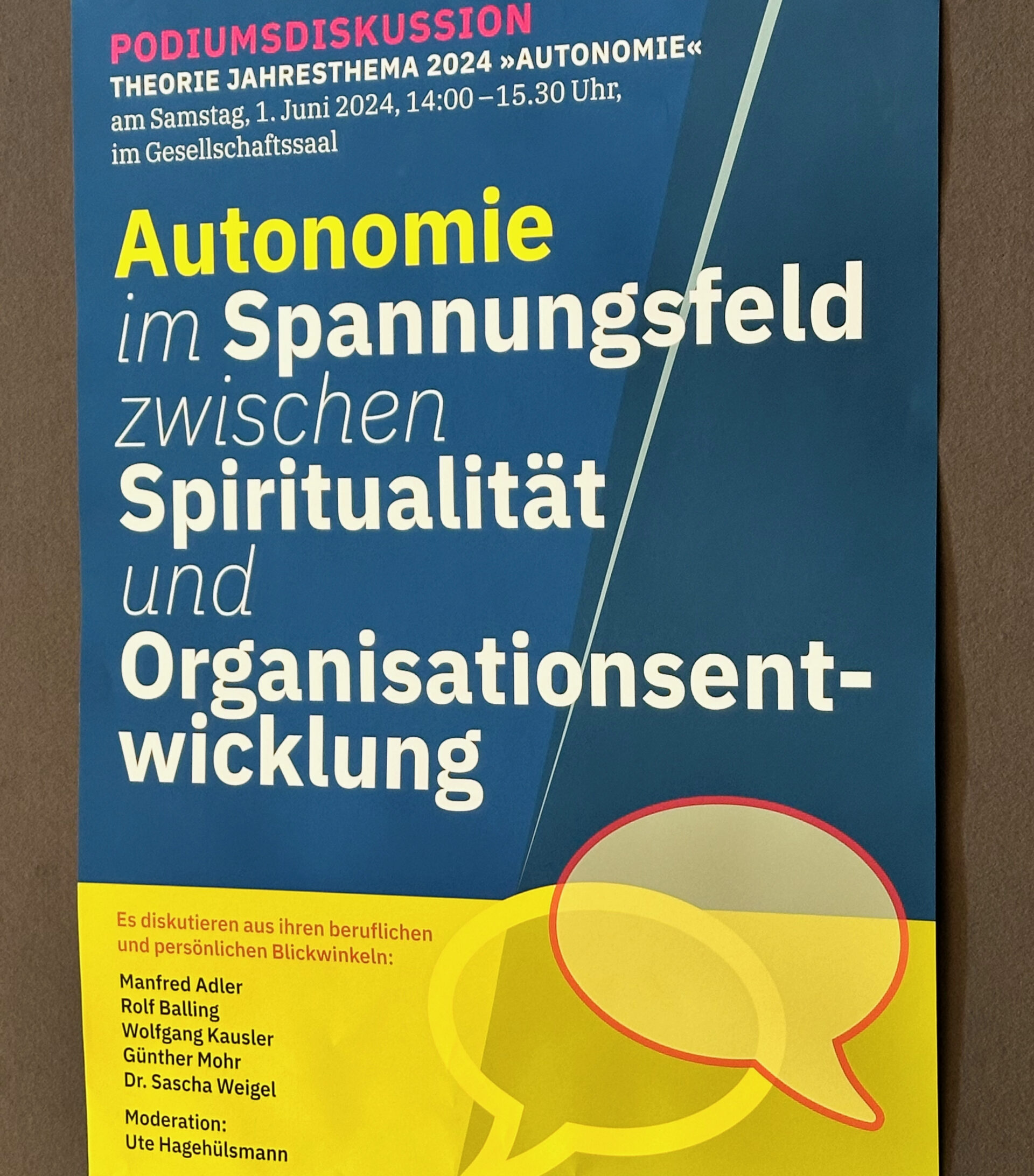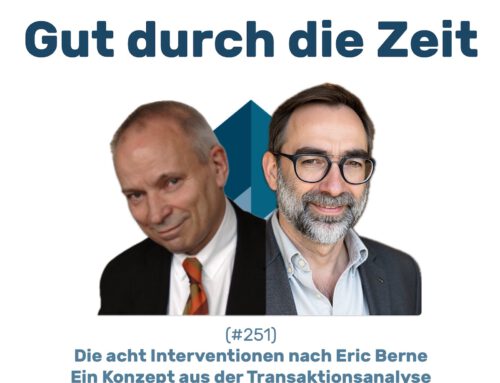Development trends in the understanding of autonomy in transactional analysis.
Thoughts on the annual theme „Autonomy“ of the DGTA on the occasion of the panel discussion at the DGTA Congress in Kassel 2024.
Autonomy is the central concept in transactional analysis
According to transactional analysis, autonomy is both a goal and a path – in both therapeutic and counselling work. It is assumed that people strive for autonomy and are always in danger of „losing it again“, activating traditional, restrictive (script) patterns and „neglecting their autonomous way of life, which is possible in principle“. In essence, this means that people
- spontaneous and can act free from script patterns (ban messages, drivers, etc.),
- fulfilling, intimate be able to establish and organise living and working relationships and
- aware and utilise all the potential available to them to make independent decisions.
Autonomy is achieved through decisions and contracts
The concept and understanding of autonomy interweave the two central life and problem-solving mechanisms that transactional analysis has emphasised from the outset: Decisions and contracts. Transactional analysis, it is emphasised, is decision- and contract-oriented. People make decisions for their lives (in the TA concept from the outset) and organise their relationships with each other (ideally) on the basis of contracts.
Thesis of this article is that the focus has shifted since the beginnings of transactional analysis. In the beginning, especially by Berne, but also by his students, the ability to make decisions was emphasised and seen as the basis of people's change work. The Gouldings' so-called New Decision School is the most visible evidence of this. However, relationship patterns, especially game theory and the script matrix, also emphasised unconscious and early decisions in the early days – and they were the starting point for healing and change efforts.
Excursus: Of course, even then babies and small children did not make decisions in the conventional sense, but at best drew certain conclusions on the basis of their circumstances. But as the „science of life relationships“, TA could certainly argue that decisions are a specialised term that is to be understood independently of everyday understanding.
Back to the thesis: Transactional analysis, characterised by the Californian Silicon Valley culture of the 1960s, whose counter-culture impact has been described many times and can only be outlined here with a mixture of faith in technology and humanistic credulity, has therefore understandably and quite consistently shaped an understanding of decision-making whose technical idea is also based on a mixture of fascination and naivety. However, as much as early transactional analysis can be understood as a „doctrine of human decision“, the understanding has changed since then.
Firstly, it was emphasised that autonomy has nothing to do with self-sufficiency, but that the relational element must always be considered. This was already shown by Berne's decision not to speak of a Psycho-Analysis to speak of a Transactional analysis. In doing so, he refers to a term that originates from economics, where it represents the core idea of a New institutional economics (instead of many only this link) was the core. This core consisted of understanding all societal, social and individual institutions as being based on contracts (transactions!). The so-called transaction cost theory analyses the frictions and frictional losses in the context of contractual relationships. And for transactional analysis, this is where the second mechanism comes to light, which Berne also formulated, but gave comparatively less importance to: the contract-orientation of transactional analysis. In this context, autonomy has also increasingly been referred to as „related autonomy“ (Schlegel).
Consequences
But what does this change in focus mean: as a new emphasis on transactional analysis as a Doctrine of relationshipsInstead of a doctrine of decisions, transactional analysis is very much in tune with the times. Ulrich Bröckling already established in the 2000s („The Entrepreneurial Self“, later building on this in more detail „Good Shepherds Lead Gently“) that the so-called Contractualism has reached a much larger social scope than widely assumed. Similar to the expansion of transactional analysis from therapeutic spaces into the everyday communication of all social contact areas (cf. the fields of application of TA organisations), this applies to the contractually based relationship in these fields of application (family, school, administration, workplace, care of the elderly, etc.).
His diagnosis was, among other things, that the vast majority of social relationships have now been converted to contractually based relationships, both in the markets, including the labour markets, as well as in families (What do you like for dinner tonight? What do you want to wear to school today? What do you want to wear to school today?, Where are we going on holiday?; questions processed in negotiation processes), schools, kindergartens (contract pedagogy!), generally in organisations (feedback!, everyone becomes a business unit!) and also in state organisation. The administration changed in the course of the Hartz laws and reorganised its relationship with former welfare recipients so that it came into contact with citizens as customers as an agency and was prepared, for example, to conclude integration agreements.
But this Shift from relationships based on trust, co-operation and tradition to contract-based relationships also has one Price and a blind spotwhich is worth looking at. If relationships are converted to contracts, they can in principle be cancelled at any time. The decision-making power wrested under the banner of autonomy becomes a gateway for competition and rivalry in contractual relationships. Those who can and are allowed to choose must opt out and deselect. Those who can swap but do not do so, even though the benefits are visible to all, must be able to give reasons. In this way, cities, spaces, events, acquaintances, friends and family members become selectable units between which I decide – and must decide. Andreas Reckwitz has described the consequences as Singularisation processes, culturalising processes of valorisation and devaluation described. No wonder that today everyone and everything around VALUATION and how naturally this neutral term is understood as a valorisation.
It is possible that a reason can be recognised here as to why postmodern people in post-industrial societies always see themselves in competition in their relationships, which leads to constraints of visibility and recognition, the mechanisms of which do not lie in their personality, but in their social circumstances. When all relationships and organisational affiliations have been converted to contracts, it is an imperative of reason to question and shape the existing, i.e. to a certain extent innate, established, traditional relationships (at all times!). And to be at the mercy of the social fact of mouldability (everyone knows this!). The freedom of possibilities creates the compulsion to utilise them. Not caring about a place of residence that enables a better school education is justifiable. Not separating from a boring person is also justifiable. And emigration is also suggested when complaints about state conditions get out of hand. This is not about entitlements, but about the constraints and social pressures that arise from them. So if you want and promote one, you will also get the other – and should not be surprised.
Punchline
The point is that from the point of view of the autonomy of the individual is not only the contractual partner, but also the subject of the contract. This is because his relationships, his social contracts (to which he has decided), are the decisive basis for the social assessment (of others!) of the extent to which he lives in a way that is appropriate to his autonomy.
This can be illustrated, for example, by the social phenomenon of the „selfie“ and „digital profile“: The social pressure evident in digital profiling on social media appears in this light as a paradoxical consequence of autonomy-driven freedoms, the exercise of which is (socially) contractual. The postmodern individual is in competition with all the others and competes for the best contracts, which are only concluded for a limited period of time. The physical, tangible life companion has become the digital Liker, who has only expressed, can express and wants to express his affection for a fraction of a second.
Autonomy as a therapeutic concept has become a cultural asset with side effects, as befits a highly effective drug. It is the flip side of the medal of freedom that the liberated individual is exposed to the constant judgement of others in the urge to enter into all kinds of relationship contracts and strives for attention and consideration, indeed has to expose himself to permanent VALUATION on the fairground of contract conclusions.
So it is no wonder, and from this point of view it is a joke of transactional analysis, that the universally audible call for MORE VALUATION is precisely that, the desire to be valued as a human being in his – surprisingly by no means natural, but rather culturally determined – value.
xxx






Leave A Comment